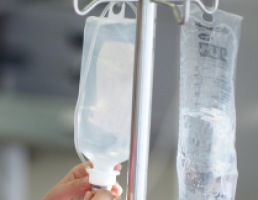
An analysis of data from 12 large clinical trials finds that the cancer’s pathologic response to chemotherapy when given before surgery (neoadjuvant) and tumour subtype are strong predictors of local and regional breast cancer recurrence, (loco-regional, reappearance in the breast or nearby areas such as underarm lymph nodes and the chest).
In fact, according to the researchers the study shows that these two predictors may be more informative than the tumour stage at diagnosis, which is commonly used in current practice, for evaluating loco-regional breast cancer recurrence risk.
This is the largest study of its kind to date.
“Women with large, but not metastatic, cancer of the breast are often treated with chemotherapy before surgery,” said Amy Early, MD, FACP, Breast Cancer Symposium News Planning Team member.
“This study provides new information about the use of tumour stage and the body’s pathologic response to neoadjuvant chemotherapy as predictors of recurrence, which may help guide physician and patient decisions about therapy following surgery.”
Neoadjuvant and adjuvant (post-surgery) chemotherapy provide equivalent survival benefits, but more women typically undergo adjuvant therapy.
An important advantage of receiving chemotherapy before surgery is that it can shrink and even often eradicate the tumour in the breast and axillary lymph nodes, and potentially reduce the need for mastectomy, lymph node removal, and radiation therapy after surgery.
“We’re finding that receiving neoadjuvant chemotherapy is not only a good option for treating breast cancer and preventing future recurrence in other parts of the body, but it also provides important information on the risk for loco-regional recurrence,” said lead study author Eleftherios Mamounas, MD, MPH, FACS, Medical Director of the Comprehensive Breast Program at the UF Health Cancer Center in Orlando, FL, and Professor of Surgery at the University of Central Florida.
“This can potentially help to better identify patients at higher risk for recurrence who may benefit from the addition of radiotherapy and those at low risk who may not need it.”
In this study, researchers assessed loco-regional recurrence rates among 11,995 women with stage I-III breast cancer who were treated with chemotherapy before surgery in clinical trials conducted in the United States and Europe.
After a median follow-up period of 5.4 years the overall proportion of patients with loco-regional recurrence was 8.3%.

Pathologic response as a predictor
At the time of surgery, women who did not have a pathologic complete response (pCR, absence of cancer in the breast and the axiliary, or underarm, lymph nodes) to neoadjuvant chemotherapy had an increased risk for loco-regional recurrence (LRR) over women who did have a pCR.
Compared to women who had a pCR, those with residual disease in the breast and no cancer in the axillary lymph nodes, had 1.6 times higher risk of loco-regional recurrence and those with cancer in the axillary lymph nodes, had 2.8 times higher risk of recurrence.
The effect of pathologic complete response on loco-regional recurrence was evident in patients treated with mastectomy and in those treated with breast conserving surgery (lumpectomy) plus breast radiotherapy.
Tumour subtype as a predictor
Loco-regional recurrence rates also differed by tumour subtype.
Compared to patients with hormone receptor-positive (HR-positive)/HER2-negative and grade 1/2 tumors (5-year risk of loco-regional recurrence: 4.2%), patients with all other tumour subtypes had elevated 5-year risk of loco-regional recurrence: 9.2% for women with HR-positive/HER2-negative, grade 3 breast cancer; 12.2% for women with triple-negative breast cancer; 9.7% for women with HR-positive/HER2-positive breast cancer; and 14.8% for women with HR-negative/HER2-positive breast cancer.
Researchers also found that more advanced stage at diagnosis did not adversely affect rates of loco- regional recurrence when pathologic complete response and tumour subtype information were taken into account.
“While more research is needed to inform new practice guidelines based on these insights, the findings provide additional information for doctors and patients to consider when trying to decide on the best loco-regional treatment options after neoadjuvant chemotherapy,” stated Dr. Mamounas.
Source: ASCO
The World Cancer Declaration recognises that to make major reductions in premature deaths, innovative education and training opportunities for healthcare workers in all disciplines of cancer control need to improve significantly.
ecancer plays a critical part in improving access to education for medical professionals.
Every day we help doctors, nurses, patients and their advocates to further their knowledge and improve the quality of care. Please make a donation to support our ongoing work.
Thank you for your support.